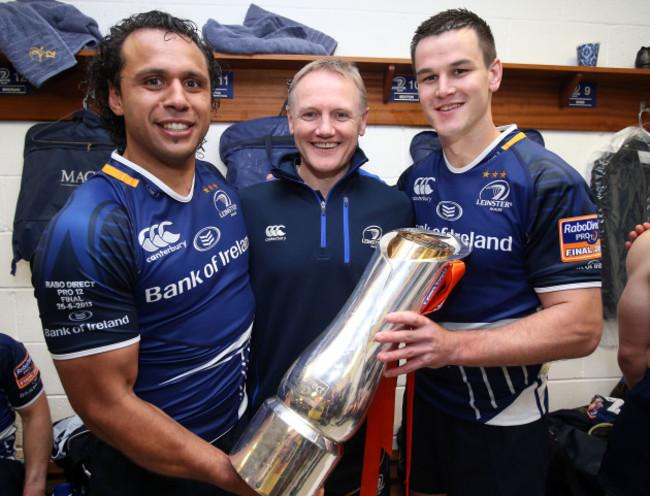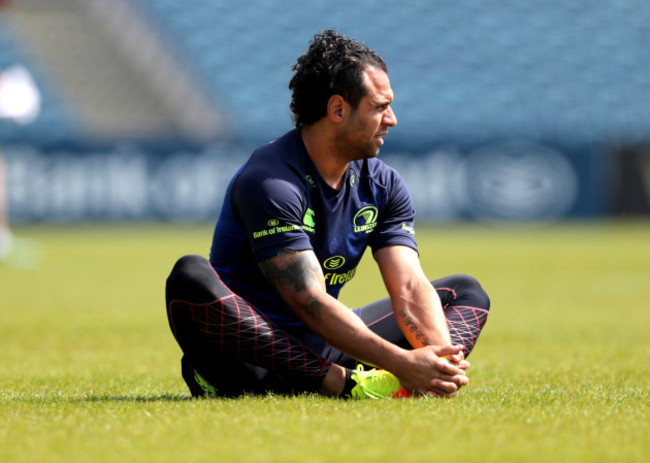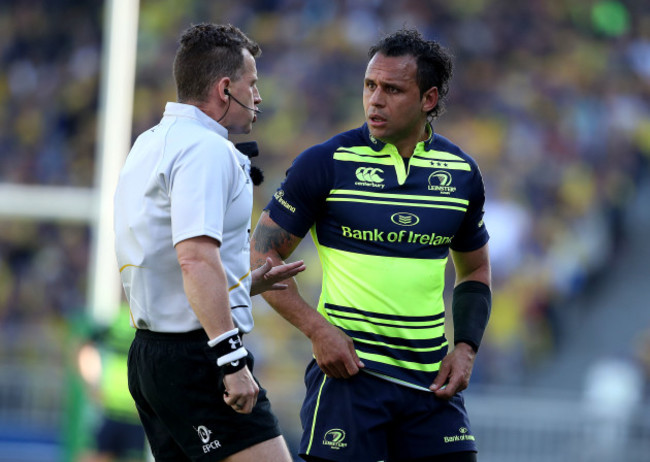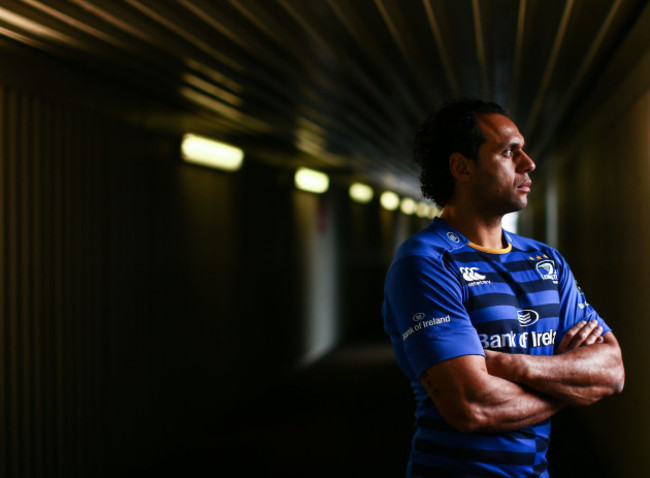ISA NACEWA’S JOURNEY into the world of mental skills began with Joe Schmidt’s prompting.
It was in 2006 at the Blues in Auckland, rather than with Leinster, and for the then 24-year-old it was eye-opening to see how seemingly straightforward mental techniques could impact on his game.
There were other factors involved, of course, but it’s interesting that 2006 was Nacewa’s real breakthrough year with the Blues, as he started 13 games at fullback, wing, out-half and inside centre, scoring five tries and kicking lots of goals.
“Joe took it on board himself to take the squad through a few mental skills activities and it was probably the first time I had opened my eyes to it and started implementing some of the skills,” explains Nacewa.
“It made a difference to my game, so light bulbs were going off in my head saying ‘this stuff actually makes sense.’
“It was simple things like visualisation of going through moves by yourself during the week, off the rugby field, really visualising where you’re going to be on the field, how you’re going to perform.
“You’re covering off the ‘what ifs’ in a game, how teams defend against you.
“And relaxing, relaxing a lot more. I think I would have been very tense as a young player and I would have been playing the game over in my head the night before the game, which isn’t a good thing because of all the energy you’re using and wasting the night before a game.
“That would have been a big one and Joe really got me to understand how to relax all the way up to kick-off. That alone made me a big difference in how I played.”
Elite All Blacks like Doug Howlett in that Blues squad were influential on Nacewa too, as he learned how those Test stars prepared themselves mentally.
“Fast forward just over 10 years and it’s such a big part of the game now,” says 34-year-old Nacewa, who is currently preparing for next weekend’s Guinness Pro12 semi-final against the Scarlets.
He has stayed focused on mental skills throughout his career and went on to take up a role as mental skills coach back at the Blues after retiring from playing with Leinster in 2013.
The intervening years had seen Nacewa adopt mental skills as a core component of his weekly preparation, while he began to study other sports like American football and golf in the latter stages of his playing career.
“In rugby, we’re probably quite a way behind,” says Nacewa. “You look at the way golfers work, there’s a whole psychology behind golf and a whole psychology in different sports. It was a learning curve for me – ‘Damn I didn’t figure this out until I’m going to retire.’”
Unsurprisingly, Schmidt – who was an assistant coach at the Blues in 2006 – is a big fan of Nacewa’s mental skills.
“I’ve never coached someone who is able to focus like him,” said Schmidt a few years ago, while also explaining that Nacewa was able to relax in between moments of extreme concentration.
The laser focus is important in Nacewa’s approach, though he is also able to have a laugh and share a joke with team-mates at other times on the pitch.
“Joe used to always teach us to stay in the moment and focus on the process,” says Nacewa now. “When you’re thinking about those two things, you can break the game down into moments. It’s about winning all those moments.
“Gradually, you also find ways to relax on the field and when to switch it on and maybe that just aids in your concentration.”
Many Kiwi players use techniques such as grounding – where they stamp their feet or focus on feeling the sole of their feet against the ground – and that in-game tool has been made even more famous by James Kerr’s Legacy book.
While Nacewa doesn’t use grounding specifically, he says the underlying point of recovering from errors and not dwelling on them is important to him.
“Some guys use grounding, I remember Ali Williams used to use a technique called ‘tapping,’ where you would see him tap his jaw.
“You never want to compound errors in a game and if you make an error, you can’t control that. That error has been made and you’ve got to concentrate on the net job. You’ve simply got to back it up with a positive.
“Out on the field, in the moment, there’s no point in dwelling on the error because you can’t control what’s gone. You can control your next movement, win the next moment.
“I don’t have a physical cue, I just do that naturally now.
“Once or twice I’ve probably just stood there and taken a really deep breath. Oxygen to the brain helps you think clearer and I have done that at times, more so when I’m goal-kicking.”
Most valuable of all in Nacewa’s weekly mental skills routine is routine itself.
He has learned over the course of his outstanding career that he performs best when ha sticks to a smooth run of consistent habits during the build-up to games.
“Routine is such a big part of mental skills,” says the Leinster man. “I’m very boring in how I prepare because I’ve been doing it for a good while and my game day… talking about routine and consistency, those two things help a lot.
“They cut a load of the distraction out during the week, and my week is always very similar.
“When it’s a game week, not much changes. I wouldn’t be superstitious about that now, where I could have been in the past, but I’ve done it for a good while and I understand what works for me.
“You could probably time me down to a tee as to how I prepare, arrive at the changing rooms, what I do.”
What is that exact routine on game day? Well, that’s not the important point in Nacewa’s eyes. What works for him may not work for another player or person, so he says it’s all about finding that perfect routine to allow the player to feel…
“Prepared. Knowing that you’ve ticked every box during the week so you don’t have to think about everything come game time is probably a good way to put it.
“You want to have done all your homework at the front end of the week, whether that’s analysing the opposition, visually understanding your role in the game plan.
“If you tick all those boxes off, then it becomes automatic to you and you can just focus on your performance, which is catching the ball, carrying the ball, doing all those things automatically.”
Nacewa took major satisfaction from his time with the Blues, mentoring the Auckland-based franchise’s younger players and introducing them to the field of mental skills and how it could impact on their careers.
Most of all, he enjoyed working with what he terms the “intermediate” players in the group.
“Guys who had been around for four years and hadn’t kicked on to be an All Black – they were guys I got more results from because they had to find something else to kick on.”
Back playing with Leinster again since 2015, Nacewa is clearly an important influence on younger players in the squad and is more than happy to help with their mental skills learning if needed.
“I don’t try and cloud younger guys with it but if there’s certain things and techniques that might help them, then I definitely offer some advice.
“But I don’t force it on anyone because there’s a lot of trial and error around it and they have to figure out what works for them.”
Intriguingly, it’s something that’s seemingly outside of the field of mental skills that has had the greatest effect on Nacewa’s mindset around rugby, and particularly his relationship to disappointment and frustration.
Of course, mental skills has had a big impact on Nacewa’s life away from rugby…
“Yeah, ask my wife! I would say she has seen a big change in me over the years. I was probably a nightmare to live with when I was younger, and inexperienced around how to manage the week and manage myself. I probably wouldn’t have talked to her from a Thursday all the way to a game day, but we all evolve.”
But then life away from rugby has also had a profound impact on Nacewa’s career…
“A big part of the change for the better was when I had kids. When you have kids, you can come home from a bad day of training or a bad game and they have zero interest in the bad mood you’re in.
“They just want to jump on top of you, they just want to play, and kids are so innocent they haven’t learned all these fears. There’s absolutely zero point in me bringing home a bad performance.
“I’d really have to sit in the car, take a deep breath and park it all outside the door. When I walk through that door, I’m just Daddy to them.
“They’ve been so critical in my success I think, even though I’ve been tired for a good number of years! They just don’t need that negative influence brought into the house.
“My wife would keep me grounded in saying, ‘Leave it at the door.’ I think I’ve gotten better over the years and probably only been pissed off two or three times after bad performances in the last four years. It’s something that’s evolved and I keep learning along the way.”
The42 is on Instagram! Tap the button below on your phone to follow us!








